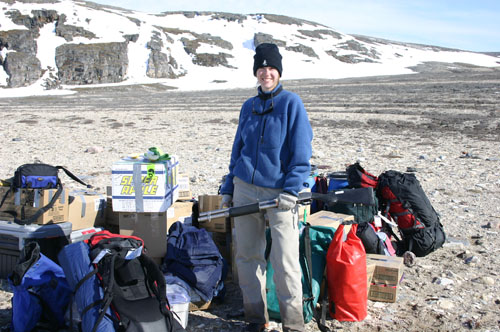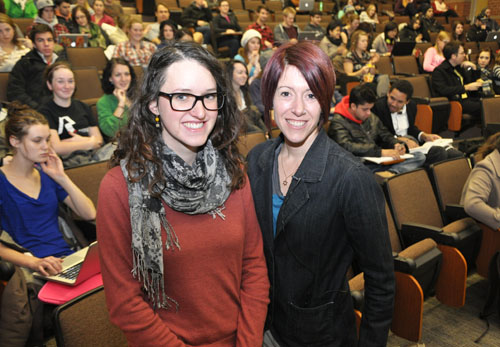It came down to a simple choice: zip up or run with her pants falling down.
Shoshanah Jacobs was 300 metres away from the field camp and still inside the biffy when she spotted a polar bear only 10 metres away. “The biffy was quite small, so when I stood up to zip my pants, I had to stick my head out the window slightly, and there she was on the tundra. She looked fierce, and she looked at me.”
Jacobs told this story yesterday in an undergraduate biology class “Humans in the Natural World” that is designed for non-science students. The class of 239 donated $900 to U of G’s United Way campaign to hear Jacobs tell true stories about her experience as a marine biologist and field researcher in some of the world’s most isolated areas, primarily the Arctic and Antarctica.
A lecturer in the Department of Integrative Biology, Jacobs was recruited for the United Way project by arts and science undergrad Jolène Labbé, who is a student co-chair of the campus fundraising drive. Labbé and biomedical science grad student Gavin Armstrong have enlisted four other faculty who are giving students a chance to choose the topic for a special lecture in exchange for donations to the United Way.
Physics professor Martin Williams has set a goal of $500 for his students in “Introductory Physics.” He plans a physics demonstration involving “a lot of ping pong balls.”
Also hoping to raise $500, history professor Christine Ekholst is offering a pre-exam podcast review for students taking her course “The Early Modern World.”
Prof. Craig Johnson, Department of Political Science, will embellish his course “Politics of Aid and Development” with a special lecture on the future of international aid. Already planned for Nov. 27, the 4 p.m. lecture in Rozanski Hall, Room 102, will be open to the campus, with donations accepted at the door.
Prof. Melanie Lang, Marketing and Consumer Studies, teaches “Applied Community Project I,” where students asked for a guest speaker. Their donations to the United Way will secure a special lecture by U of G president Alastair Summerlee.
Jacobs says her students wanted to hear “everything that can go wrong, go gross or go funny when on a scientific expedition.” Her first attempt at defending herself against a polar bear was part of the lecture.
Thinking she might have to run for her life, Jacobs chose to zip up her pants before loading her shotgun. “With polar bears around, you never go anywhere – not even to the biffy – without carrying a shotgun.” She had it with her inside the tiny structure but had to step outside before chambering the bullet. “There just wasn’t enough room in there.”
The large female bear watched as Jacobs chambered the bullet and fired into the air. The bear also watched as the kickback knocked Jacobs to the ground, ruining her display of courage. “Apparently loud noises do not impress a species that regularly walks on cracking and creaking ice. While I was getting to my feet, the bear turned her head away and oh so very slowly wandered off in the opposite direction.
“I ran back to camp as fast as I could and hoped I wouldn’t be labelled the new recruit who let a polar bear scare the crap out of her.”

While riddled with humour, Jacobs’s lecture stressed the importance of comprehensive training and minimizing risks during Arctic research. She also expressed her admiration for explorers like Sir John Franklin, whose ill-fated 1845 expedition to chart the Northwest Passage has made him a Canadian legend, and Australian explorer Douglas Mawson, who “literally walked off the soles of his feet” in Antarctica during a 100-mile trek to regain his base camp in January 1913 after two companions and their sled dogs all perished.
“Some of us are born explorers,” said Jacobs, whether it’s in the Arctic or on the moon. “Because of their explorations and research, we know so much more about our planet and how we as humans fit into and attempt to understand the natural world.”
That’s the bottom line for Jacobs’s class and her current research on biomimetics theory (how ideas are transferred from biology to technology), philosophy and natural economies.
She applauds Labbé for the undergrad’s efforts on behalf of the United Way: “The way I see it, a bit of fun and silliness will only increase effective learning for the remaining lectures in my class, and it’s for an amazing cause that brings us all together.”

Labbé and Armstrong report a current total of $5,310 donated by U of G students toward a goal of $8,000. In addition to the charity lectures, students have donated through the University Bookstore by adding a dollar to their purchases and through cash donations.
The United Way co-chairs say a number of student organizations are hosting special events, and a student residence blitz is being planned by undergrads Benjamin Hayes and Laura Cuthbertson. U of G students can also deduct a United Way gift from their meal plans on the Hospitality Services website.